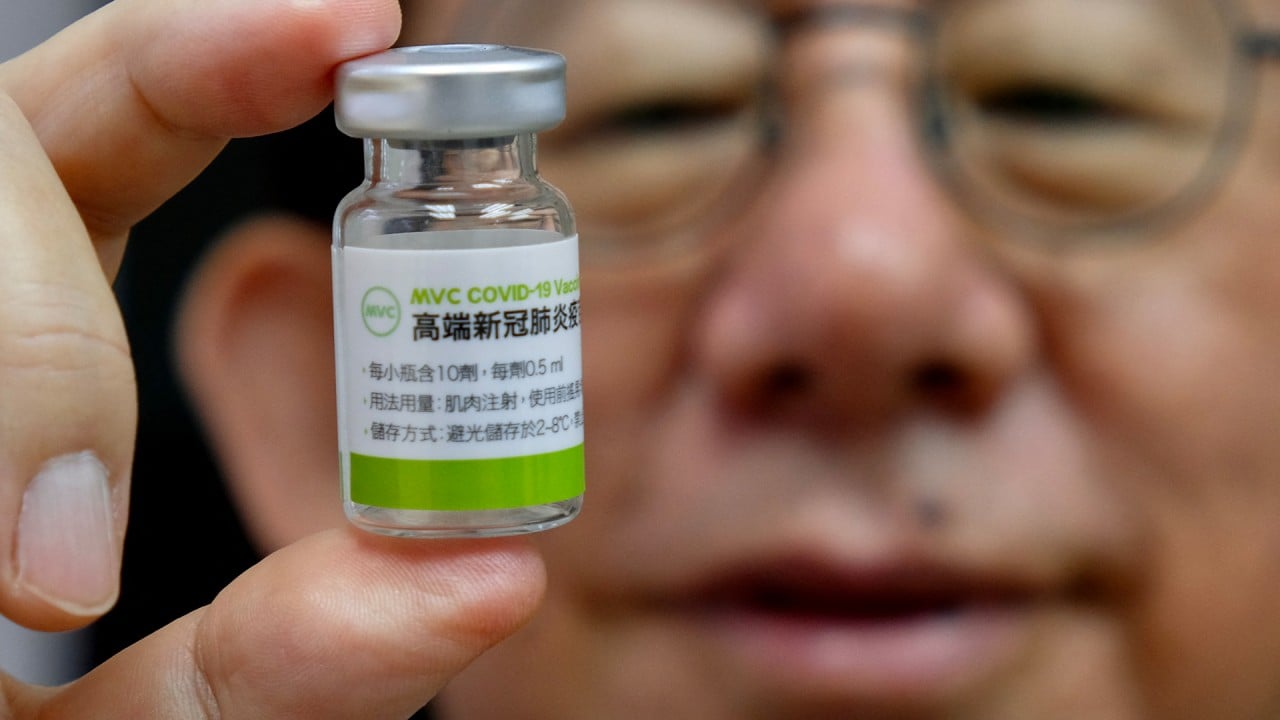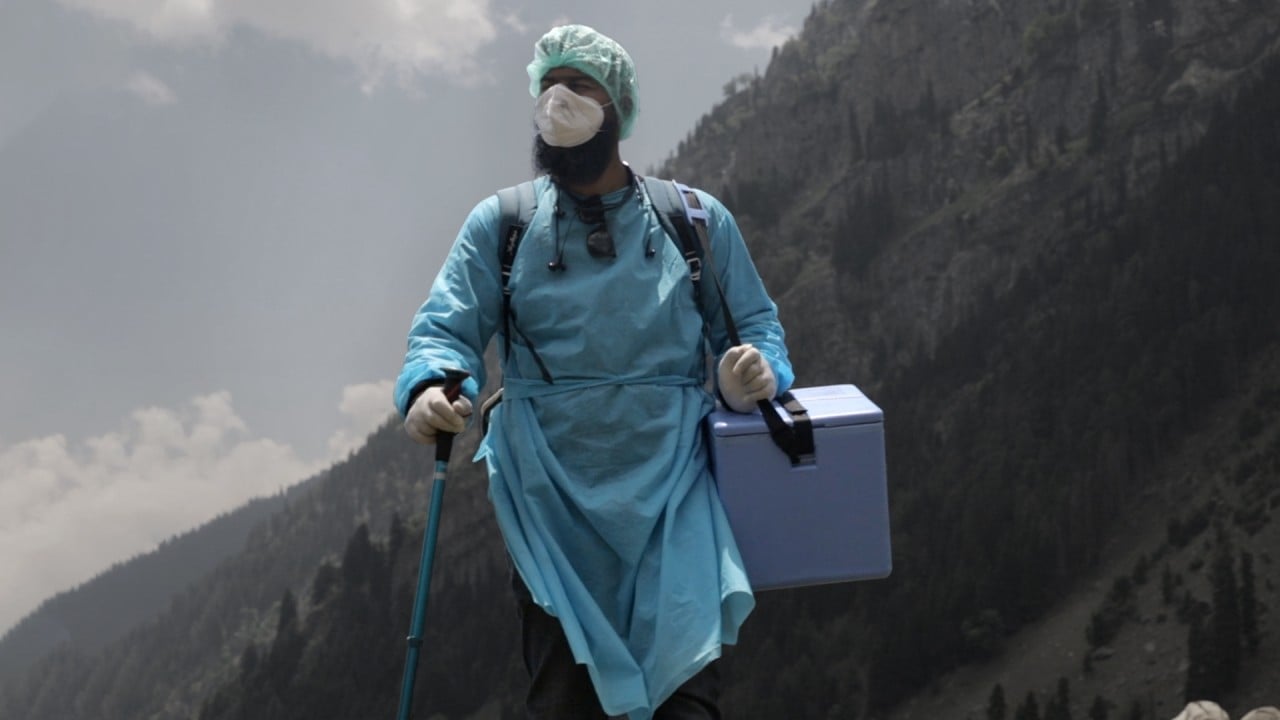
06:18
SCMP Explains: What’s in a Covid-19 vaccine?

US President Joe Biden just got his Pfizer booster shot amid efforts to institute vaccination mandates in the United States to improve the inoculation rate. In Singapore, Prime Minister Lee Hsien Loong got his Pfizer booster shot last week. The city state of 5.7 million residents, which has also relied on Moderna for its national vaccination programme, is now offering booster jabs to seniors and will soon open bookings for those aged above 50.
Other wealthy nations such as Britain and Israel have also booked and hoarded supplies of high-profile Covid-19 vaccine brands as they embrace booster shots to protect their populations from more virulent variants.
In the developing world, this situation could create an opening for lesser-known vaccines that have not been used widely outside the countries in which they were produced, and in many cases have yet to receive World Health Organization approval.
Already, little-known Covid-19 vaccines are entering the spotlight amid global supply constraints that have affected poorer countries’ efforts to get jabbed.
“Unfortunately, countries are likely to explore any option that might be available, but would be well advised to take their cue from the WHO SAGE recommendations on which vaccines are recommended following adequate interrogation of the evidence supporting the safety and efficacy of the vaccines,” said Shabir Madhi, a professor of Vaccinology at the University of the Witwatersrand in Johannesburg, South Africa.
“It’s not about where the vaccines are manufactured, but the scientific evidence of their safety and efficacy. Unfortunately, some vaccines are being deployed without having the necessary data to support their widespread use, based on limited studies that are undertaken.”
Vietnam, which has fully vaccinated less than 10 per cent of its population of 96 million people, agreed this month to purchase 10 million doses of Cuba’s three-shot Abdala vaccine, receiving the first shipment of 900,000 doses from its socialist ally last week.
The Abdala jab is one of five indigenous vaccines in use or under development in the Latin American country, all of which are yet to receive WHO approval.

06:18
SCMP Explains: What’s in a Covid-19 vaccine?
Latin American and Caribbean countries including Argentina, Venezuela, and Jamaica have signalled interest in purchasing Cuban vaccines, and Iran started producing and authorised use of the island nation’s Soberana 2 jab earlier this year.
Cuban authorities have said Abdala has been shown to be more than 92 per cent effective in local trials, but data from the studies has yet to be published in peer-reviewed international journals.
In India, officials have flagged plans to resume exports of homegrown vaccines from next month, after suspending shipments in March amid a devastating fourth wave of infections.
Indian Health Minister Mansukh Mandaviya told local media last week he expected overall domestic vaccine production to exceed one billion doses in the last quarter of 2021, “more than enough to meet domestic demand”.
Before restricting exports, India, home to the world’s largest vaccine-maker, the Serum Institute of India, donated or sold more than 65 million doses to dozens of countries, with the lion’s share being the locally manufactured version of AstraZeneca, Covishield.
India’s three domestically approved jabs include locally developed Covaxin, developed by state-run Bharat Biotech, which has yet to receive approval from the WHO.
WHO officials are expected to meet next month to discuss emergency authorisation for Covaxin, which has so far only been authorised in a small number of mostly developing countries including Guyana, the Philippines and Zimbabwe.
Bharat Biotech has said it expects to manufacture 35 million doses of the vaccine in September and 55 million doses next month, with plans to produce 100 million doses each month by the end of the year.
Covaxin, which has been reported by its maker as showing 77.8 per cent efficacy in Phase 3 trials, has accounted for about 12 per cent of the vaccines administered in India, which has supplied at least one dose to 65 per cent of its 944 million adults.

02:34
All eyes on Taiwan’s home-grown vaccines as 2 local developers await emergency approval
Last month, Indian regulators granted emergency authorisation for the world’s first DNA vaccine, Zydus Cadila, which works by introducing a small piece of the virus’ genetic code in DNA molecules called plasmids.
Another locally developed jab, Corbevax, developed by Hyderabad-based Biological E, is in the final phase of clinical trials, with expectations it could be ready for use by December.
Phase 1 trials for India’s first mRNA-based Covid-19 vaccine, HGCO19, developed by Gennova Biopharmaceuticals Ltd, wrapped up last month, with authorities giving the green light to further clinical trials.
India also manufactures well-known non-locally developed vaccines including the Johnson & Johnson and Sputnik V jabs.
Other countries including Japan, South Korea, Thailand, Indonesia and Vietnam are working to develop homegrown vaccines in the expectation demand for inoculations will continue for years to come.
Shahid Jameel, a virologist and visiting professor at Ashoka University in Hyderabad, India, said boosters at this stage of the pandemic made “little scientific sense” and would further strain supplies of mainline vaccines.
“Covid-19 has shown the acute need for distributed manufacturing for better access and equity,” Jameel said.

14:05
Health workers trek to remote areas to bring Covid-19 vaccines to Indian-administered Kashmir
Jameel saw promise in emerging and non-mainline vaccines, particularly DNA vaccines.
“For me the genetic vaccines stand out,” he said. “That is the future. Now that the immunogenicity of DNA is getting better with needle-free intradermal vaccination technology, we should pay more attention to these. DNA is easier to make and more stable than RNA.”
Jerome Kim, director general of the International Vaccine Institute in Seoul, South Korea, said it was important vaccines went through the necessary approval processes and it remained unclear how less-studied vaccines would respond to boosters in the future.
“The problem with boosters is that it isn’t a simple matter of giving a matched or mismatched third dose,” Kim said. “There are some things that are ‘rules of thumb’ and others that are derived empirically by testing.”
“The Cuban vaccine hasn’t reported real efficacy data yet,” Kim added. “Sputnik has yet to be approved by the WHO for emergency use. How would we use them? The beauty of the current process is that each vaccine is theoretically receiving the same level of review through WHO. Hopefully it isn’t too political a process but one driven by science.”